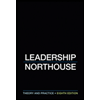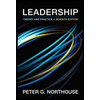
EBK THE LEADERSHIP EXPERIENCE
7th Edition
ISBN: 9781337516020
Author: DAFT
Publisher: YUZU
expand_more
expand_more
format_list_bulleted
Question
Chapter 3, Problem 7DQ
Summary Introduction
To discuss: Whether person X thinks that participative style is the most effective way to reach the decision and whether he believes some leaders let followers to participate for other reasons.
Expert Solution & Answer
Want to see the full answer?
Check out a sample textbook solution
Students have asked these similar questions
Make a comment on:
This article titled "Ethical Decision Making in Organizations: The Role of Leadership Stress" relates to the ideas found in Chapter 1 of Arnett et al. The article underscores the importance of ethical decision-making within organizations. It highlights real-world examples of unethical behavior by leaders and the severe consequences such behavior can have, aligning with the notion of ethics discussed in Chapter 1. This emphasizes that ethical decision-making deals with moral issues that can have consequences for others and echoes the concept in Chapter 1 that ethical conflicts often arise from differing moral perspectives and the potential harm or benefit to others.It identifies leaders as moral agents responsible for making ethical decisions, even though they may not always recognize the moral issues at stake. This corresponds with the idea that individuals in conflict situations may hold different ethical values, as discussed in Chapter 1.The article explores the…
Why do many organizations simply wait to engage employee viewpoints until after a decision has been made?
How can leaders facilitate participatory management?
Leadership styles refer to the approach and behaviors that leaders adopt to influence and guide their teams towards achieving organizational goals. Different leadership styles have distinct characteristics and can be effective in various situations depending on factors such as organizational culture, team dynamics, and the nature of the task at hand.
Some common leadership styles include:
1. Autocratic Leadership: In this style, the leader makes decisions without consulting the team members, retaining full control over the decision-making process. While this style can be efficient in certain situations, it may lead to reduced employee morale and creativity due to limited participation.
2. Democratic Leadership: Also known as participative leadership, this style involves consulting team members in the decision-making process and encouraging their input. Democratic leaders value collaboration and seek to empower their team members, fostering a sense of ownership and commitment.…
Chapter 3 Solutions
EBK THE LEADERSHIP EXPERIENCE
Knowledge Booster
Similar questions
- Stephanie is trying to employ the normative decision model to assist in making leadership decisions. Based on the model, which quality helps her select the better alternative between a better or worse alternative?arrow_forwardThe team enjoys being involved in the decision-making process. The manager values the perspectives and interests of each group member. What type of leadership style does the manager utilize?arrow_forwardFollowership is what allows for leadership. You cannot lead without followership. I also think in order to be a good or great leader, you must also be a good or great follower. This requires you to be humble and observant, even if you are in a leadership position to take a step back and become a follower for a time period, this in turn will help you become and develop as a better leader. What the important thing to know about followership is that it allows for leaders to learn something about other leaders and learn something about themselves. The role of the follower can be one of self-control and in being strong in that can help the leader out with making his or her job easier. Followers can also observe how the leader works and adopt the models that he or she practices.arrow_forward
- choose 2 styles and cite an example or scenarios Autocratic It is also called directive or dictatorial leadership. Leaders who take this approach make decisions without consulting the employees. Leaders always provide orders and expect that employees will comply obediently. Democratic Leadership. It is also called consultative or consensus leadership. Leaders who take this approach involve the employees in decision making. The leader will only make the final decision after receiving the inputs and recommendations of team members. Participative Leadership. It is also known as open or non-directive leadership. Leaders who take this approach exerts little control in the decision making process. The leader allows the team members to develop strategies and solutions to the problem of the organization. Goal-Oriented Leadership. It is also called results-based or objective-based leadership. Leaders who take this approach ask team members to focus solely on the goals at hand. The leader only…arrow_forwardHow can a leader effectively balance the needs and desires of their team members while still maintaining a clear and consistent direction for the organization?arrow_forwardOftentimes, a person who is assigned to a management position has proven that she can be entrusted with the responsibilities inherent to that position. However, this is not always true, and the wrong individual can receive a promotion that they were undeserving of. A good leader must be able to determine the best person to fill these leadership roles and this assignment will ask you to reflect on the qualities that these leaders must possess. What are the qualities of an effective leader? If the leader does not have these qualities can they be acquired over time through education, knowledge, and experience? Or are good leaders simply born into these roles?arrow_forward
- Leadership is a multifaceted concept that encompasses various skills and attributes essential for guiding individuals or groups towards a common goal. Effective leadership involves inspiring and motivating others, setting a clear vision, and providing direction and support to achieve objectives. Furthermore, strong leadership requires excellent communication skills, empathy, and the ability to make tough decisions under pressure. It also involves fostering a culture of trust, accountability, and collaboration within the team or organization. Additionally, effective leaders lead by example, demonstrating integrity, resilience, and adaptability in the face of challenges. By empowering and developing their team members, leaders can cultivate a sense of ownership and commitment, driving performance and fostering innovation. Question: What are some key strategies that leaders can employ to cultivate a positive and inclusive work environment that encourages creativity, collaboration, and…arrow_forwardIn his 2012 book, ‘There is an I in Team', Mark De Rond finds that people are self-interested no matter how much leaders try to inspire them to a cause. Rather than ignore this fact, De Rond believes leaders should embrace and learn to deal with it. If that’s the case the best thing for leaders to do to try to achieve goals is: 1. Remove people who cannot work well within teams and allow them to work independently to achieve expected results. 2. Try to manage a sense of commitment amongst team members. 3. Build a strong performance ethic within the organization. 4. Encourage team members to face one another when they communicate. 5. Recruit based on recent prior performance rather than character.arrow_forwardIs laissez-faire leadership equivalent to essentially noleadership at all? Why or why not?arrow_forward
- Leadership is a multifaceted concept that encompasses various styles and approaches tailored to different situations and contexts. Some leaders adopt a democratic style, encouraging participation and input from team members, while others may lean towards a more autocratic approach, making decisions independently. Situational leadership recognizes that effective leaders adapt their behavior based on the needs of the situation and the Individuals Involved, whether it's providing guidance and support or delegating tasks and responsibilities. Ultimately, successful leaders possess the flexibility and insight to navigate diverse challenges and inspire their teams to achieve excellence. Question: How does the concept of situational leadership contribute to the effectiveness of leaders in navigating complex organizational environments, and what strategies can leaders employ to develop this adaptability?arrow_forwardYou are completing a group project in class with a group of three friends. The group is working cohesively and there are no issues. What type of leadership style would you use to motivate the group? a member who is uncooperative and unresponsive to group chats. How would you change your leadership style?arrow_forwardEffective leadership is that which goes well with a given situation.. list the obstacles that are involved in Effective leadership .arrow_forward
arrow_back_ios
SEE MORE QUESTIONS
arrow_forward_ios
Recommended textbooks for you
 Leadership: Theory and PracticeLeadershipISBN:9781506362311Author:Peter G. NorthousePublisher:SAGE Publications, Inc
Leadership: Theory and PracticeLeadershipISBN:9781506362311Author:Peter G. NorthousePublisher:SAGE Publications, Inc
 Leadership: Theory and Practice, 7th EditionLeadershipISBN:9781483317533Author:Peter G. NorthousePublisher:SAGE Publications, Inc
Leadership: Theory and Practice, 7th EditionLeadershipISBN:9781483317533Author:Peter G. NorthousePublisher:SAGE Publications, Inc

Leadership: Theory and Practice
Leadership
ISBN:9781506362311
Author:Peter G. Northouse
Publisher:SAGE Publications, Inc


Leadership: Theory and Practice, 7th Edition
Leadership
ISBN:9781483317533
Author:Peter G. Northouse
Publisher:SAGE Publications, Inc